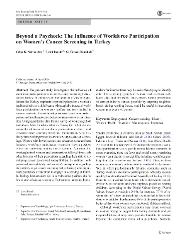| dc.contributor.author | Sen, Celia K. Naivar | |
| dc.contributor.author | Baruh, Lemi | |
| dc.contributor.author | Kumkale, Gökçe Tarcan | |
| dc.date.accessioned | 2019-06-27T08:01:37Z | |
| dc.date.available | 2019-06-27T08:01:37Z | |
| dc.date.issued | 2016 | |
| dc.identifier.issn | 0360-0025 | en_US |
| dc.identifier.issn | 1573-2762 | en_US |
| dc.identifier.uri | https://hdl.handle.net/20.500.12469/421 | |
| dc.identifier.uri | https://doi.org/10.1007/s11199-016-0611-4 | |
| dc.description.abstract | The present study investigates the influence of workforce participation on women's cancer screening behaviors in Turkey. In cultures with predominantly Muslim populations like Turkey emphasis is typically placed on a woman's traditional role as a child bearer. Although the impact of workforce participation on women's welfare has been studied in various contexts the relationship between workforce participation and health protective behavior has received scant attention. Using quantitative data from a survey of women aged 40 and above from 33 urban cities in Turkey (N = 483) we examine the influence of workforce participation on breast and cervical cancer screening behaviors. Homemakers were less likely than working/retired women to be up-to-date on screenings. Women with lower income and education screened less | en_US] |
| dc.description.abstract | however workforce participation seemed to have a positive effect on screening among these women. Additionally working/retired women and homemakers differed from each other in terms of their perceptions regarding their risk of developing cancer (perceived susceptibility). In addition both perceived susceptibility and women's perceptions regarding their ability to get cancer screening (self-efficacy) were significant predictors of intention to engage in screening in future. In Turkey homemakers are in a vulnerable position due to lower rates of cancer screening. Furthermore targeting homemakers for interventions may be easier than trying to identify other low screening groups of women such as those with lower education or income. Interventions raising perceptions of susceptibility to cancer possibly by targeting neighborhoods during working hours could be useful in increasing screening rates at risk women. | en_US] |
| dc.language.iso | eng | en_US |
| dc.publisher | Springer/Plenum Publishers | en_US |
| dc.rights | info:eu-repo/semantics/closedAccess | en_US |
| dc.subject | Employment | en_US |
| dc.subject | Cancer Screening | en_US |
| dc.subject | Islam | en_US |
| dc.subject | Women | en_US |
| dc.subject | Health | en_US |
| dc.subject | Intention | en_US |
| dc.subject | Mammogram | en_US |
| dc.subject | Pap Smear | en_US |
| dc.title | Beyond a Paycheck: The Influence of Workforce Participation on Women's Cancer Screening in Turkey | en_US |
| dc.type | article | en_US |
| dc.identifier.startpage | 599 | en_US |
| dc.identifier.endpage | 611 | |
| dc.relation.journal | Sex Roles | en_US |
| dc.identifier.volume | 75 | en_US |
| dc.department | Fakülteler, İktisadi, İdari ve Sosyal Bilimler Fakültesi, Psikoloji Bölümü | en_US |
| dc.identifier.wos | WOS:000390049300006 | en_US |
| dc.identifier.doi | 10.1007/s11199-016-0611-4 | en_US |
| dc.identifier.scopus | 2-s2.0-84963760386 | en_US |
| dc.institutionauthor | Kumkale, Gökçe Tarcan | en_US |
| dc.relation.publicationcategory | Makale - Uluslararası Hakemli Dergi - Kurum Öğretim Elemanı | en_US |
















